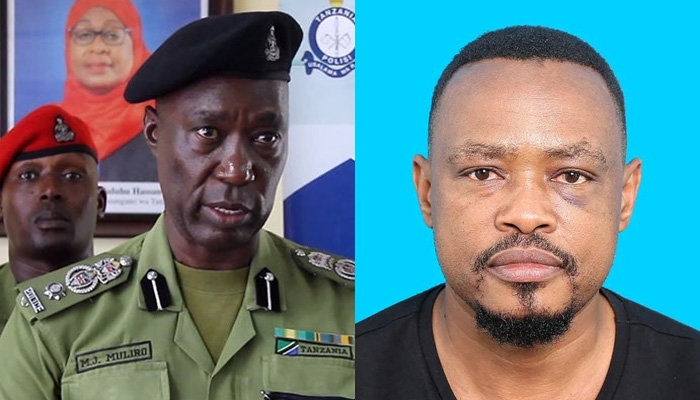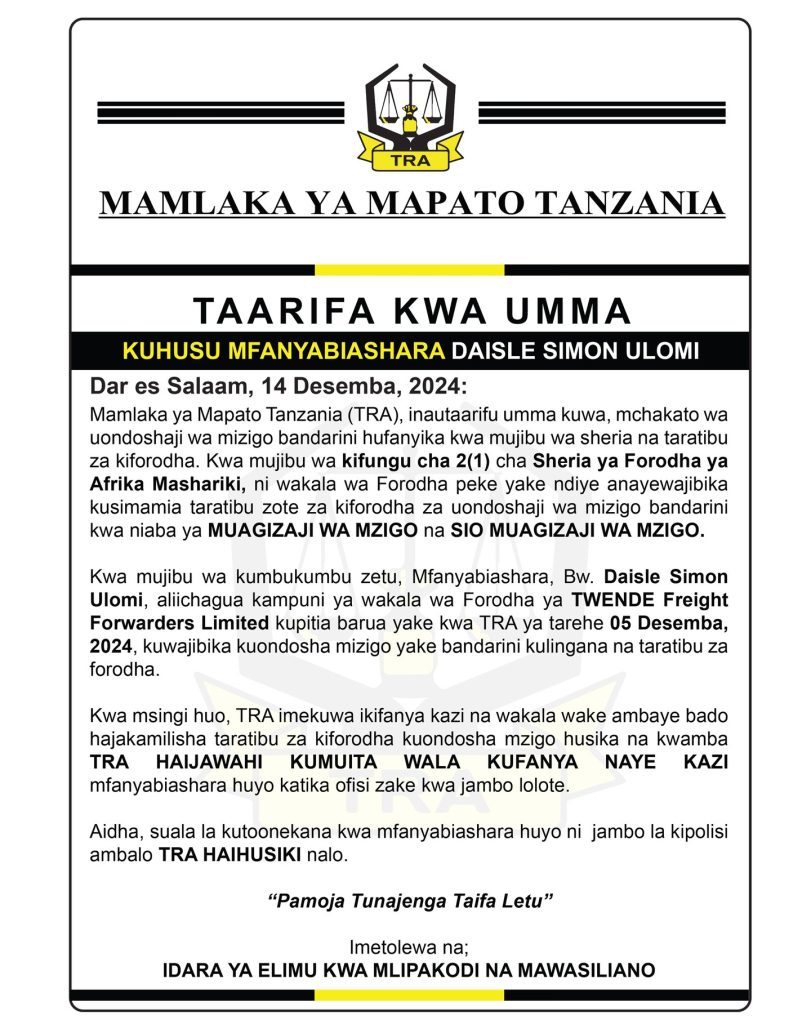Yes, you read the title of this article, right? There are two disappearances, but the outcomes are different. One was found in a mortuary, and the other was caught hiding in a witch doctor’s place somewhere in Pemba.
We are beginning to see genuine disappearances being taken advantage of by unscrupulous people with hidden agendas. This may run out of control if not checked before it gets out of hand.
Welcome to Tanzania, once a peaceful nation now bedevilled with real and fake kidnappings. In the first disappearance, one businessman hired an agent to sort out his cargo, which had arrived by shipping.
One bright afternoon, he received a call from his agent that he was required to physically go to the port where his container would be opened for inspection.
TRA was said to require that evaluation in his presence. The hapless man informed his loved ones before heading to where he was called, but he never arrived.
His agent tried to reach him by phone, but he did not receive a response. As evening approached, he decided to report the matter to the nearby police station.
The police, after coming to terms with the disappearance in less than 24 hours, told the agent they could not take his complaint until 24 hours had elapsed.
The following day, the businessman was nowhere to be seen. Hence, relatives decided to report the matter to the police, and a missing man report was prepared.
While the whereabouts of the missing man were still unresolved, TRA defended herself that it had nothing to do with the disappearance.
Since their client had sought the agent’s services, TRA dealt with the agent, not directly with them.
That TRA statement became the first flashpoint that something was not right. According to the agent, TRA demanded that the container owner be physically present when the container was unlocked.
Therefore, TRA’s subsequent claim that since their client had appointed an agent, he was no longer required to be present during the opening of his container physically starkly contradicted the agent’s statement.
The agent said it was TRA that made his client attendance mandatory, but TRA said that was not the case. Two diametrically opposite statements signalled one of the two sides was not truthful.
ALSO, READ: Tanzania’s Local Elections: Democracy Undone or an Era of Pretend Pluralism?
It is easier to side with the agent for apparent reasons. He had nothing to gain from lying. The TRA spokesperson may not have the facts when he shared the TRA’s side of the story, or the deception was intentional.
If TRA’s public statement had been frantically prepared and issued, some innocent omissions might have been committed.
That is understandable. But, if the denials were purposeful, then TRA would have something to hide.
Without many details, assuming that the former position was correct is safer. In a matter of three days, one hospital in Dar es Salaam reported a dead man was brought to their mortuary who had been fatally accident.
Later, the police collaborated on the story and went on to say the deceased was riding a bodaboda before he met his death.
The explanations may be truthful, but the public is left with unanswered questions when details are scanty.
Was the deceased driving the bodaboda, or was it being driven? Where was the accident bike? Whoever killed him, where was his vehicle and its number plates in question?
Or the deceased had just lost direction and bumped into something and died?
If a vehicle was involved in the accident where is the vehicle and the driver? Will they be charged, or were they left roaming the streets and killing another bodaboda user?
The police did not respond more comprehensively, which could have been by mistake, but it stoked the claims and counterclaims of many conspiracy theories.
And when TRA’s outright denials that contradicted the agent’s version of the events left gaping holes in the whole tragedy.
That does not mean foul play was committed, but less information in this predicament was harmful.
The second disappearance caught our frayed nerves. A wave of disappearances has left a nation rearing to a boiling point.
Somewhere in Dar es Salaam – Tegeta Kwa Ndevu -, TRA officials were attacked by a mob, leading to one death and injuries after residents suspected that undercover police were out to kidnap one of their own.
Such violent responses will become more common after the trust in security forces has deteriorated to precipitous levels.
What is of concern is that the security forces do not involve local leaders or flash out court arrest warrants before arresting people whom they suspect of wrongdoing. Lack of local leader participation, in the long run, will lead to many beatings and fatalities of government officials.
Somewhere in the past, in rural Dodoma, government officials boarded a double cabin pickup to attend to an official matter.
No sooner than they had disembarked from their pickup, an unruly mob descended upon them and killed all of them.
They also burnt their official SUV. Much later, we learned that rumourmongers had convinced the villagers that the officials were bloodsuckers!
Henceforth, the attack was self-defence. Many villagers were rounded up and charged with murder.
The disturbing question was how the public was not informed before such encounters. Do public officials just walk in and expect a warm welcome?
Times have certainly changed, and we ought to adapt, too. In Mwanza, the police in civilian clothes wanted to arrest a person of interest, but residents restrained them, citing a lack of trust with the police.
The mob demanded that the OCS personally come to arrest the suspect, and if he disappeared, they would hold the OCS fully responsible.
They said many people were apprehended by people in civilian clothes claiming to be police, but when those people vanished without a trace, the police claimed they were not aware of the arrests.
Moreover, the arrested people were not in the police custody.
Such situations raise stronger possibilities that some of the arrests are either not carried out by the police or the police are fully conversant but are in denial because the arrests have been eliminated.
The relationship between security forces and the citizens is so low that it will take a tinderbox before hell breaks loose.
Getting back to the second disappearance, the victim was “just married” and had left his grotto to hire a minibus that would ferry relatives back home.
On his way to fetch a hired bus, he sent a cryptic message that a Landcruiser was following him. Then his phone went off.
After hours had gone, his loved ones grew nervous and began sharing news of his disappearance in the social media. Many believed the bad cops had forcefully taken him.
The worst fears grew until the police informed the public this guy was a con man. He had faked his kidnapping to swindle his creditors to Tshs 90 million.
The car he was driving was a borrowed one that, on the day he claimed he was abducted, had sold for Tshs 9 million. He was paid Tshs 8 million with a promise to get the balance later.
After selling the car, he went to Pemba to seek the assistance of a witch doctor. It is unclear what the traditional healer was expected to do.
Was it to make his debt spirit away or make the creditors forget or forgive him, or could the doctor have given him a new identity and lease on life?
It looks like he was a victim of con men because the debt he had accumulated was just before he got married.
Someone could have enticed him to take huge loans in the hope that witchcraft would clear him of any wrongdoing.
The witch doctor, too, could be part of the scams. Those who introduced him to the traditional healer could be part of a stratagem to fleece people of their hard-earned cash.
Unless that criminal syndicate is exposed and tackled, we could be hearing a lot of similar vices.
Conclusion
The police arrest protocol should be reviewed to restore public trust. The public will never accept people who are called to police stations, and later, the police deny those people never arrived to them.
Police in civilian attire should not be permitted to arrest people to plug gaping holes of criminals posing as police kidnapping innocent civilians in the hope the police will be framed and blamed.
All arrests must involve local leaders to avoid fingerpointing and erosion of trust between the public and the police.
As more insidious arrests are allowed, we should expect the people to fight back. This is bad karma for the rule of law.
“Polisi Jamii” is lip service if arbitrary arrests without local leadership involvement are allowed.
Casual arrests will harm the relationship between the police and the people, with dire consequences waiting to throw a bigger punch.
Once that happens, rewinding the clock will not be easy.



These, kind of situations should be dealt with accordingly!, the police should show their professionalism, in order to get more support from wananchi, so even those people with bad habits be exposed.